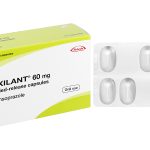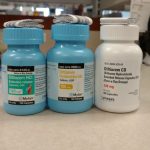How Long Does Dexilant (Dexlansoprazole) Stay In Your System?

Dexilant (Dexlansoprazole) is a medication used to treat conditions like gastroesophageal reflux disease (GERD), erosive esophagitis, and other acid-related digestive issues. The medication works by reducing the amount of acid produced in the stomach, alleviating symptoms like heartburn and acid reflux. One question that often arises is how long does Dexilant stay in your system? In this article, we’ll explore the answer to this question in detail.
Before we dive into the specifics of how long Dexilant stays in your system, it’s essential to understand the medication’s pharmacokinetics. Pharmacokinetics is the study of how drugs interact with the body and the processes involved in drug absorption, distribution, metabolism, and elimination. Understanding these processes can help us understand how long the medication stays in the body and how it affects the system.
Absorption
Dexilant is taken orally, and once it enters the body, it is absorbed in the stomach and small intestine. The medication is a delayed-release capsule, which means that it is designed to release the drug slowly over a period. The drug is meant to be taken whole and not crushed, chewed, or broken. Crushing, chewing, or breaking the capsule can cause the medication to release too much at once, leading to adverse effects.
Distribution
Once absorbed, Dexilant is distributed throughout the body. The drug enters the bloodstream, and its concentration in the blood increases. Dexilant is highly protein-bound, which means that most of the medication binds to proteins in the blood and doesn’t circulate freely. This protein binding can affect the distribution and elimination of the medication.
Metabolism
Dexilant is primarily metabolized in the liver by the cytochrome P450 (CYP) enzyme system. The CYP enzyme system is responsible for breaking down drugs in the body, and different drugs are broken down by different CYP enzymes. Dexilant is mainly metabolized by the CYP2C19 and CYP3A4 enzymes. Some people have genetic variations that affect the activity of these enzymes, which can affect the metabolism of Dexilant.
Elimination
Once metabolized, Dexilant is eliminated from the body through the kidneys and feces. The medication has a relatively short half-life, which is the amount of time it takes for half of the drug to be eliminated from the body. The half-life of Dexilant is around 1 to 2 hours, which means that it takes approximately five to ten hours for the medication to be fully eliminated from the body.
How long does Dexilant (Dexlansoprazole) take to work?
Dexilant (Dexlansoprazole) takes 1-2 hours to work which is when the first peak occurs after administration, the second peak occurs within 4 to 5 hours. The timeframe for Dexilant to fully work varies depending on the individual and the specific condition being treated. Typically, the initial effects of Dexilant can be noticed within a few hours of the first dose, providing relief from symptoms such as heartburn and acid reflux within the first day or two of treatment.
However, it is crucial to note that Dexilant may take multiple days to achieve its maximum effect in reducing acid production in the stomach. In certain instances, it may take up to four weeks of uninterrupted treatment to attain the maximum benefit.
It is recommended to follow your doctor’s instructions regarding the dosage and duration of treatment if you are using Dexilant for a medical condition. If you do not notice any improvement in your symptoms after a few days of using Dexilant, or if your symptoms become worse, it is crucial to contact your doctor for further guidance.
Factors that affect how long Dexilant (Dexlansoprazole) stays in your system
Several factors can affect how long Dexilant stays in your system. These factors include:
Dosage: The higher the dosage of Dexilant, the longer it will take for the medication to be eliminated from the body.
Frequency of use: Taking Dexilant regularly can lead to the drug building up in the body, which can prolong the medication’s duration in the system.
Individual metabolism: Different people have different rates of metabolism, which can affect how long the medication stays in the body.
Age: As we age, our liver and kidney function may decline, which can affect how long it takes for Dexilant to be eliminated from the body.
Other medical conditions: Some medical conditions can affect how long Dexilant stays in your system. For example, liver or kidney disease can affect the metabolism and elimination of the medication.
How Long Does Dexilant (Dexlansoprazole) Stay In Your System
The half-life of Dexilant is around 1 to 2 hours. The half-life is the amount of time it takes for half of the drug to be eliminated from the body. Based on this, it can be estimated that Dexilant may take about 5-10 hours to be fully eliminated from the body.
However, it is essential to note that some people may take longer to eliminate Dexilant from their system due to slower metabolism or other medical conditions affecting drug clearance. Additionally, the effects of Dexilant may continue even after the drug has been eliminated from the system due to its long-lasting impact on acid production in the stomach.
It is important to follow your doctor’s instructions on the dosage and duration of treatment and to consult with them if you have any concerns about the duration of Dexilant in your system.
Can You Flush Out Dexilant (Dexlansoprazole) Faster From Your Body?
It is not recommended to try to eliminate Dexilant faster from your body without first consulting with a healthcare provider. While the medication has a relatively short half-life, attempting to speed up the elimination process can potentially lead to adverse effects or interfere with the medication’s therapeutic effects. It is essential to follow your doctor’s instructions regarding the dosage and duration of treatment and to never stop or modify the treatment regimen without first consulting with your healthcare provider.
However, there are a few things you can do to support your body’s natural elimination processes and potentially speed up the medication’s elimination:
- Stay hydrated: Drinking plenty of fluids can help flush out the medication and its metabolites from your body. Aim for at least 8-10 glasses of water per day.
- Get regular exercise: Exercise can help improve blood flow and stimulate the elimination of waste products from the body. It is essential to talk to your healthcare provider before starting any new exercise regimen.
- Eat a balanced diet: A diet rich in fiber, fruits, and vegetables can support digestive health and promote regular bowel movements. This can help eliminate the medication and its metabolites from the body more quickly.
- Avoid alcohol and tobacco: Alcohol and tobacco can interfere with the liver’s ability to metabolize drugs and slow down the elimination process.
Again, it is crucial to talk to your healthcare provider before making any changes to your treatment regimen or attempting to eliminate the medication faster from your body. They can provide personalized advice and guidance on how to manage any side effects and support your body’s natural elimination processes.





